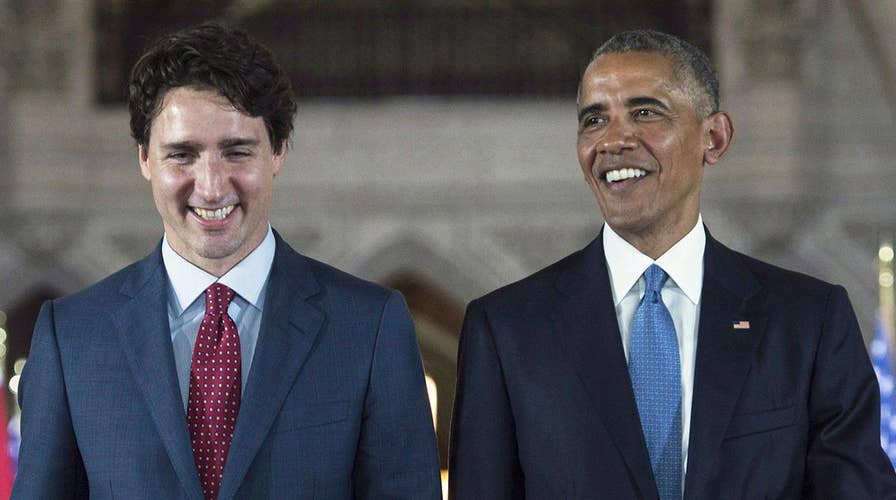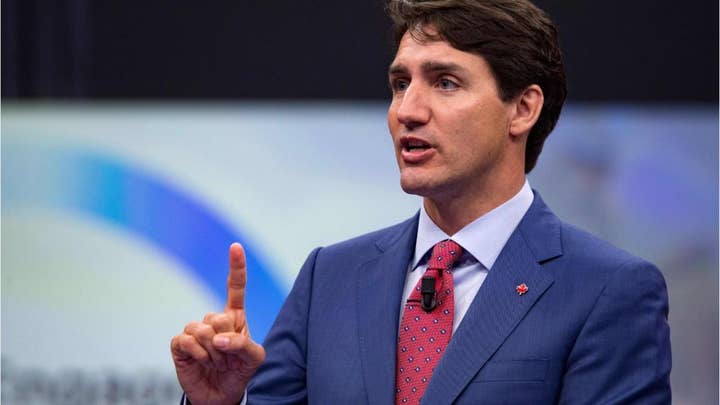Former President Obama endorses Canadian PM Trudeau in upcoming election, yet to announce support for former VP Biden
Reaction and analysis from former DPCC press secretary Rochelle Ritchie and Fox News contributor Guy Benson.
After six weeks, four debates and countless opinion polls, Canada’s election will finally come to a chaotic end on Monday. But what will come next — and who will emerge as prime minister — is anyone’s guess.
Liberal Party leader Justin Trudeau is continuing a full-court press to convince Canadian voters to keep his party in power for a second term, something that looks far from certain at this point. After securing the — somewhat controversial — endorsement of former President Barack Obama via Twitter earlier in the week, Trudeau decried what he said was a “more polarized, more divisive election” than the one he fought in 2015.
This campaign began as a two-horse race, and it remains highly likely that either Justin Trudeau’s Liberal Party or the opposition Conservative Party, led by Andrew Scheer, will take the reigns of power after Election Day. But the rise of two smaller parties has greatly complicated either Trudeau or Scheer’s chances of winning a majority of seats in Parliament.
After a disastrous performance by Andrew Scheer in a French-language television debate earlier this month, his party began bleeding votes in the all-important province of Québec to the Bloc Québécois, a party that advocates for that province separating from the rest of Canada.
CANADA'S JUSTIN TRUDEAU WEARS BULLETPROOF VEST AFTER SECURITY THREAT: REPORTS
For nearly 20 years, the Bloc dominated federal politics in Québec — the party won a majority of the province’s seats in every election from 1993 to 2008. But as fervor for independence in the province has cooled, so too has support for the party — after winning at least 38 seats in six straight elections, the Bloc won just four seats in 2011, and 10 in 2015.
At first, the Bloc’s newfound momentum was coming entirely at the expense of the Conservative Party. However, in the final weeks of the campaign, would-be Liberal voters, especially those beyond the city of Montréal, have also begun moving toward the Bloc and its charismatic new leader, former television personality Yves-François Blanchet.
Blanchet has attacked his counterparts from other parties for their opposition to Québec’s Bill 21, a law that bars those who wear overt religious symbols from holding a broad range of public-sector jobs. Where other party leaders have denounced the law as discriminatory — and unconstitutional — Blanchet has argued that the law is popular with Quebecers and therefore shouldn’t be subject to interference from Ottawa.
Along with the rise of the Bloc in Québec, the resurgence of the socialist New Democratic Party in Canada’s other nine provinces has also hurt the two frontrunners. Prior to the outset of the campaign, the NDP’s young leader Jagmeet Singh, the first visible minority to lead a Canadian political party, was largely written off by commentators as a weak leader. But over the past six weeks, Singh has proven an effective campaigner, and the NDP's stock has risen to nearly 20 percent in opinion polls, up from around 13 percent at the start of the election.
WATCH: CHILDREN CONFRONT JUSTIN TRUDEAU ON WHY HE PAINTED HIS FACE BROWN

Liberal leader Justin Trudeau pose with supporters during a campaign stop in Orillia, Ontario on Friday Oct. 18, 2019. (The Canadian Press via AP)
The NDP’s recovery is posing problems for the Liberal Party, particularly in inner Toronto, the Vancouver suburbs and in the country’s sparsely populated far-north, all regions that the Liberals had planned on nearly sweeping in their path to a parliamentary majority. But the NDP is also hurting the Conservatives’ chances of winning seats in working-class areas of Ontario and the British Columbia interior.
At a campaign stop in Montréal’s east-end on Wednesday, Trudeau acknowledged for the first time that his party may not come in first place on election night, and called on Canadians to “elect a progressive government, not a progressive opposition.”
With less than 72 hours to go until polls close, the general consensus is that a minority government — where no party holds a majority of seats in the country’s House of Commons — is extremely likely, if not a certainty.
That would not be out of the ordinary in Ottawa. Canada was governed by three back-to-back minority governments following the 2004, 2006 and 2008 elections. Even the Liberals under Justin Trudeau’s father, Pierre, were reduced to a minority after their first term in 1972. (The country went to another election within 18 months and elected a Liberal majority that time.)
But the constitutional rulebook for how Canada should be run in a minority scenario is murky. In an interview with CTV National News this week, Scheer said that whichever party wins the most seats — even if they fail to win a majority — should be given the opportunity to form government.
BLACKFACE DAMAGES TRUDEAU AT POLLS AS HE VOWS LOWER TAXES, CELLPHONE COSTS
“We’re not going to ask other parties for support,” Scheer said to CTV’s Lisa LaFlamme.
But the reality is a bit less clear. Even if the Liberal Party comes in second place in seat-count, as the incumbent government,most constitutional scholars agree that the party would have the right to attempt to continue governing, provided they can secure the support of enough opposition MPs.
It is likely that a Trudeau minority government would be able to win the support of New Democratic MPs. Singh indicated in several interviews last week that he would even consider forming a coalition government with the Liberals if it meant the Conservatives were locked out of power.
“…Whether that’s working together with others, whether that’s in a coalition, whatever it is — I want Canadians to know, if you vote New Democrat, you get fighters,” the NDP leader said to reporters on Thursday in Welland, Ont.
Similarly, Green Party leader Elizabeth May has said her MPs will be prepared to support any party that “takes the climate crisis seriously.”
What is less clear is which party a minority Conservative administration would be able to easily rely on for support in Parliament. The Bloc has made clear they will not form any coalition with any other party, and will only vote for bills, budgets and motions that come before Parliament if the party deems them to be “in Québec’s best interests”. However, Bloc MPs did work with former Prime Minister Stephen Harper’s Conservatives when they ran the country as a minority from 2006 to 2011.
Scheer has attempted to raise fears of what a Liberal-NDP coalition government could look like in an attempt to turn Tory voters out.
In Winnipeg on Monday, the Conservative leader told reporters that “only a Conservative majority government can prevent a government with Justin Trudeau as the spokesman but the NDP calling the shots.”
Scheer also spent much of the day Friday defending his entirely made-up claim that a Trudeau minority relying on New Democrat support would hike the country’s federal sales tax by 2.5points, something that neither party has ever discussed doing.
CLICK HERE FOR THE FOX NEWS APP
When confronted by journalists over the claim on a campaign stop in Fredericton, N.B., Scheer doubled down, saying, “It’s not misinformation at all. Justin Trudeau did a lot of things that wasn’t in his platform after 2015. And so you’ll pardon me if I don’t trust him on that.”

